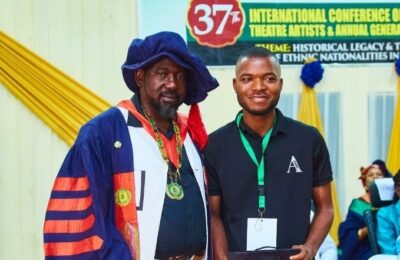By Halima Hassan
In the heart of West Africa, a vibrant culture thrives, along the Niger River, a rich heritage survives. Meet the Nupe people, a tribe of strength and grace. With a history that spans centuries and a story to amaze.
The Nupe history by the Ahmadu Bello University site said the Nupe trace their origins back to Tsoede an Igala prince from Idah during the 15th century. The Nupe state was brought about by conquest. Tsoede was the son of an Igala father and a Nupe mother. He later returned to his maternal home and gained control over the vast area of Nupe land, extending this kingdom by conquering neighbouring land. The Nupe people have a rich history of interactions with neighbouring tribe including the Yoruba, Hausa and Igala. They are called Nupawa by the Hausas and Tapa by the Yorubas.
According to Wikipedia, the Nupe Tribe have a population of 4.5 million, they are the dominant ethnicity in Niger state, an important minority in Kwara state. Also present in Kogi state, as well as the Federal Capital territory.
The Nupe call themselves Nupei and refer to the language as Nupe.They speak the language of the Nupoid group in the Benue-Congo branch of the Niger-Congo language family. Other languages in the group are Igbira (Ebira), Gbagyi (Gbari), Gade, and Kakanda. Nupe is related most closely to Gbari and Kakanda in structure and vocabulary. There are at least two markedly different dialects: Nupe Central and Nupe Tako, all these amazing facts are gotten from Africa 101 last tribe.
The Unique people of Nupe Blog have these to say about the Nupe Tribe in terms of economic and commercial activities, they are not left out. Nupe land is made up of an agrarian population, where the economy and social life revolve around agriculture. The people are active farmers. Major crops grown are rice, sorghum, sugar cane, millet, melon, vegetables, yam, homestead livestock management, and fishing. Cassava, maize, and sweet potatoes (grown inland) are of secondary importance. Those around the riverside areas are predominantly fishermen and their wives are actively engaged in processing and selling fish.
Some of the cottage industries that are simple income-generation avenues to Nupe people are traditional soap making, blacksmithing, brass work, wood work, tailoring and cooperative engagements. Modern industries in Nupe land include Nigerian Sugar Company, Bacita, Sunti Sugar Company, Sunti, Jebba Paper Mill and the two major Hydro Electricity Stations in Nigeria – the Kanji Dam, New Bussa and Jebba Dam, Jebba. Hence, Nupe land is the power base of Nigeria.
Every tribe in Nigeria have a unique food. A major staple food that is common to many households in Nupe land is rice. This is prepared either as joloff rice or in the form of “eje boci” (mashed) rice. The reason for this development is due to the fact that majority of the farmers both within and around fadama lands (Low land marshy areas) which allow for the cultivation of rice, in communities like Jima, Doko, Edozhigi, Bacita, Katcha, Gbara etc have rice production as a major and profitable venture. Hence, the explanation why rice is a common feature in households’ diet in Nupeland. Another delicacy that goes with rice is fish; both smoked and fresh fish are in abundance, especially from adjoining tributaries around Rivers Niger and Kaduna. All villages and towns around the bank of these rivers and other smaller rivers engage in fishing activities all year round.
Other food types include mashed meal “eje boci” which Hausas refers to as “tuwo” from –sorghum, millet, and maize. These are served on alternate basis with beans, cooked yam, potatoes and garri. Sometimes beans is mixed with “Yiwara” (ground sorghum) or millet sprinked on beans after conversion into paste form. Other common foods are porridge from millet, sorghum or maize called “Kunu”. This is consumed along with certain snacks like akara (bean cake), “masa” sorghum cake, “mashe” (early millet cake) or “Dankuwa” special confectionery from a combination of fried ground nut and maize and lastly Kuli-Kuli made from groundnut after extraction of groundnut oil, where the paste from that process is fried; this is popular with students as African “biscuit”. These snacks are very important in Nupeland because they facilitate “casual” eating especially among children when they like to soak garri and drink along with these snacks of interest. Most significantly, they are used to take breakfast when served as porridge.
This also brings to focus, the consumption of “left over” (Jekun) that is cooked with fresh ingredients. Jekun is the second cooking of leftover food from previous supper. This left-over is from “eje boci” (mashed food) of rice, millet, sorghum or maize origin.Several dishes are served with specific soups in Nupeland. Some of these soups are stew made of tomatoes with either meat, chicken or fish. It is good for all kinds of food; it goes with “eje boci”, white rice, yam, etc. Other soups are Ezowa (bean soup) significant for “eje boci” from rice and vegetable soup that is sometimes mixed with melon that is served along with “eje boci” rice. Others are Ningbana (from liquid ground sorghum). Ningbana is delicious if served with left-over (Jekun) second cooking of left-over food. Other common soups are from Herbiscus Sobderifa (Calyx) known as “Emagi”, Okro soup, Baobab leaf soup (Kuka) among others. One significant soup ingredient in Nupe land is “Kula” processed locust bean that is Nupe’s version of “Dadawa” (Hausa) and “Iru” (Yoruba).
Among the Nupes, marriage is a sacred institution which is contracted between a man and a woman. The two people involved are referred to as “eba yawo and yawo” meaning husband and wife.Traditionally, marriage could be contracted in one of two ways: The would-be bridegroom asked for the consent of the girl (sometimes the girl suggested to her father whom she wanted to marry), or the marriage was arranged by the heads of the families. Polygynous marriages were very common both before and after the introduction of the Islamic faith. Marriage involves the payment of a bride-price by the groom, and post-marital residence is patrilocal. Marriage has no real meaning without procreation. Barrenness is regarded as a curse and a misfortune, and traditional means are utilized to secure fertility or cure barrenness. Divorce rarely occurs because men want to avoid the publicity and ridicule of divorce proceedings in Alkali court (Islamic court). Most marriages are terminated only by the death of a spouse. Widows must remain in the compound for five months before they can remarry.
The Nupe are a primarily Muslim people now. However, a few people still worship the tradition spirits associated with natural objects as well as some Christians in certain areas.Islam is now the predominant religion in Nupeland, though Christianity is a common religion in very few communities where the pioneer activities of missionaries were recorded. Traditional religion was practised before the introduction of Islam. Therefore, traditional religion is no longer recognised nor practiced in Nupeland (Wikipedia). Where such practices still occur, there is no societal recognition and practitioners are in secrecy due to shame, isolation and degrading status and the condemnation which practitioners are likely to face. Therefore, Islam is undoubtedly the predominant religion in the entire Nupeland with Christianity as the other religion practised by a lower proportion of the population. Hence, the majority of Nupe people have their culture altered with the introduction and acceptance of Islam.
The common festivals in Nupeland are Pategi Regata – A colourful canoe festival on River Niger in Pategi, Bariki celebrations in Bida – The fifth day of Sallah festival of both Id-fitr and Id-Kabir celebrations in Bida. Each of this celebration lasts five days. The fifth day is marked with fun fare, where the Etsu-Nupe rides on a horse backed with all titleholders on ground to support the Etsu Nupe in a beautiful procession of horses. People come from far and near to watch this colourful event. The procession is from the Emir’s palace in Wadata through the heart of the city to the Governor’s lodge in (GRA) Government Reservation Area known as Bariki (Elite’sresidential area) and Gani festival in Kutigi – Annual traditional boxing contest, where men display their strengths. A strong confident person comes out and challengers file out and he choses who he feels like taking on. It normally attracts large crowds from different parts of Nupeland and beyond.
People’s opinion about Nupe people varies. Someone said that nupe people are only from Niger state not Kwara. Another person said they are known to be the real owner of fish processing and farming. A man said he rate Nupe people to be the most beautiful and Curvy girls in the whole Nigeria. Some people praise them for their cooking skills and dress sense.
The Nupe people is one of the most unique tribe in Nigeria.
– Hassan Halima Ojonugwa (22MC1126),
Mass Communication,
Prince Abubakar Audu University Anyigba.




